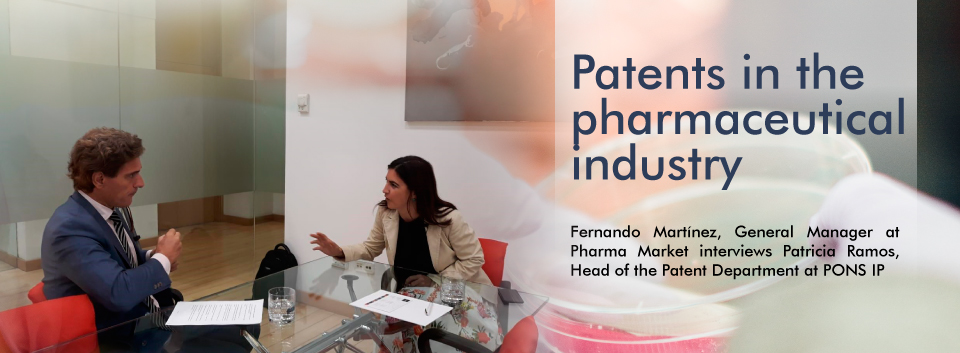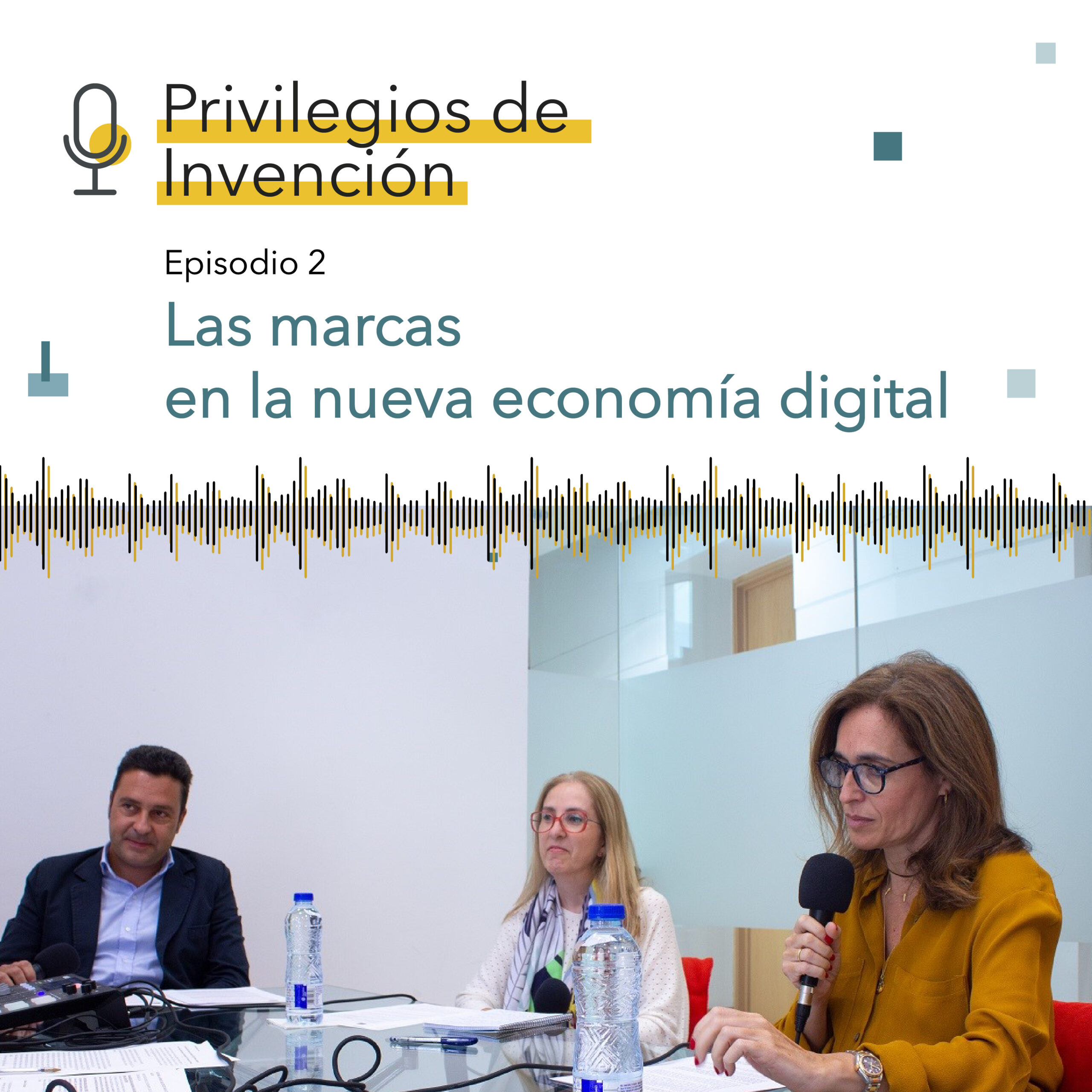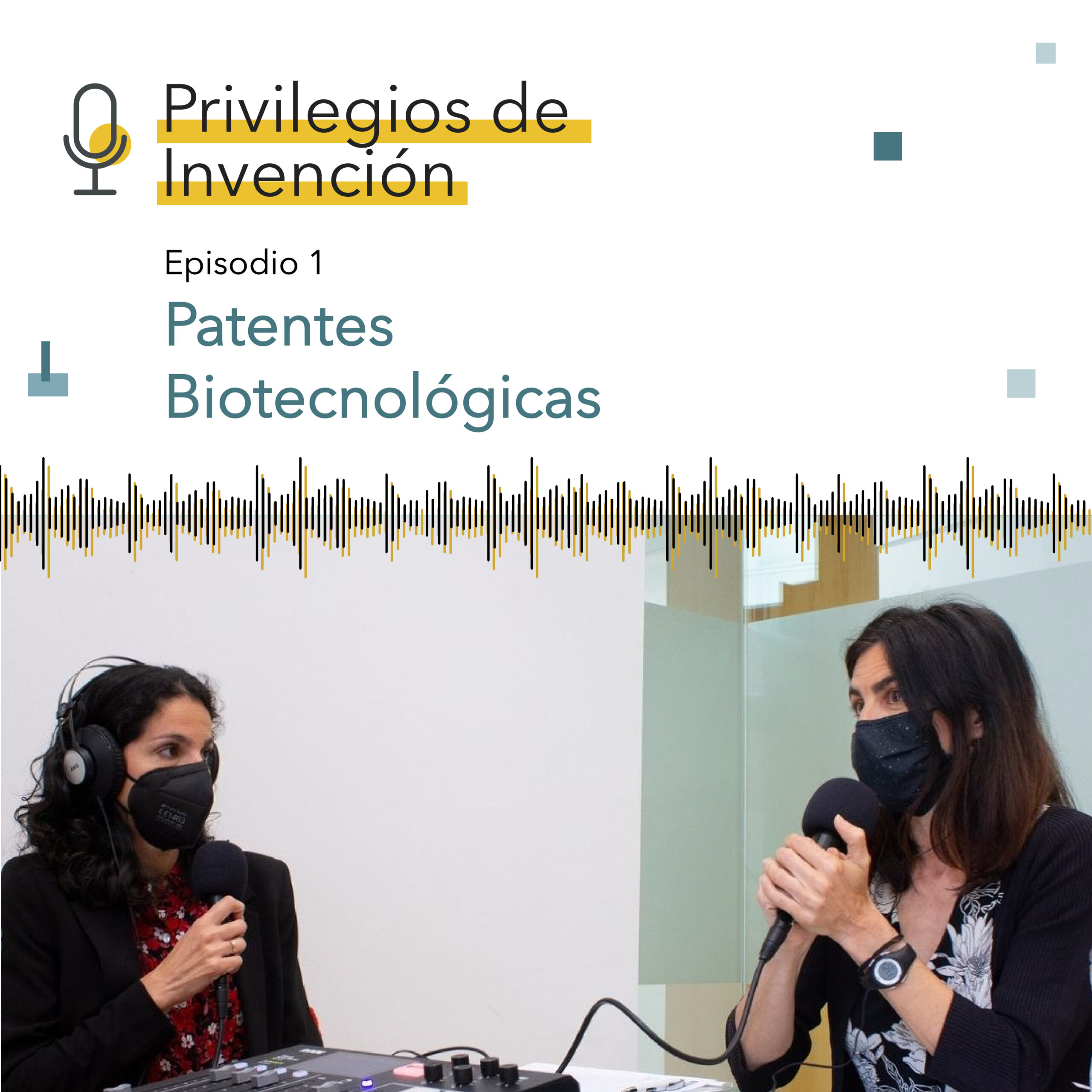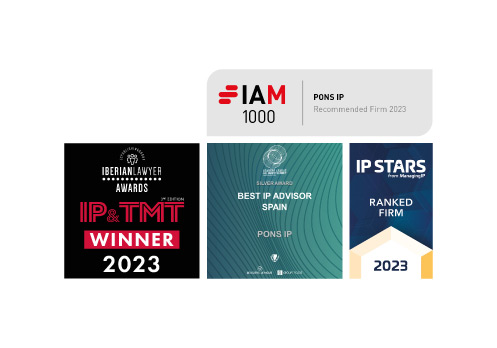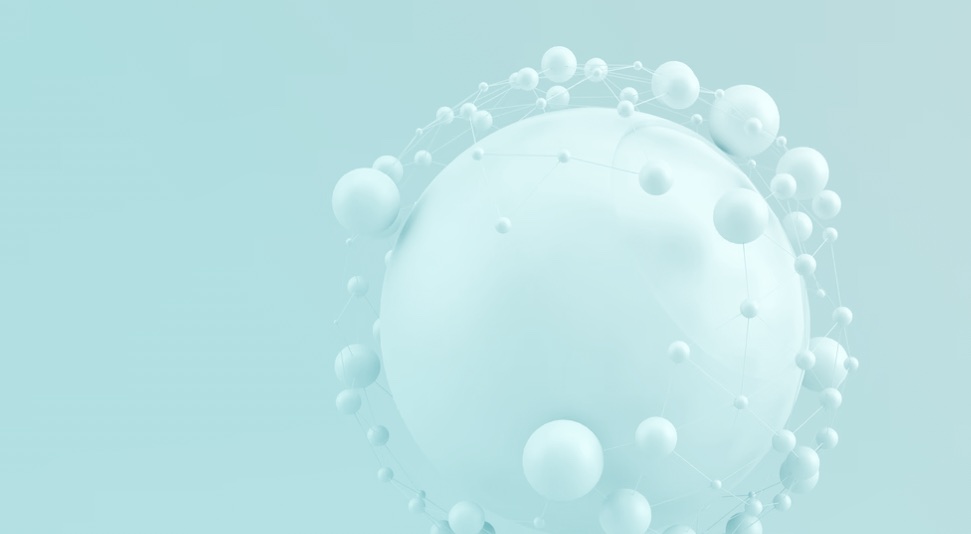With more than 16 years of Intellectual Property experience in Patent departments behind her, Patricia Ramos is the current Director of PONS IP’s Patent team. She earned a Degree in Chemistry from the Universidad Autónoma de Madrid (UAM), before studying for a master’s degree in Organic Chemistry and then a postgraduate degree at the Paul Sabatier University of Toulouse.
Pharma Market traveled to interview her about the current situation regarding patent registration in Spain, and more specifically in the pharmaceutical industry. Among other issues, we discussed innovation, regulations, public-private partnerships, incentives, and lack of patent information.
What is the current situation of patents in the pharmaceutical industry in Spain and its evolution over recent years?
Patricia explained that patents, in the pharmaceutical industry and globally in Spain, were in ‘free-fall’. “Although we have been affected by this so-called crisis of free-fall over the last few years, the truth is that we have never actually had as large a number of patent applications in any industry as they have in other countries such as Germany, China or the United States.
With the changes in national regulations with respect to patents, it was thought that it might go one way or the other, but the number of applications has remained the same.
It is true that there is growth with respect to the application for European patents, but it is very small,” she added.
We asked Patricia about the impact of the new 2018 Patent Law on the pharmaceutical industry: “It was something that had been eagerly awaited for a very long time: we had a law dating back to 1986, and it was obsolete. This change has been an almost exact copy of European patent regulations, so we are already adjusting. Pharmaceutical companies have adapted phenomenally to this legislative change, because they are already working with European regulations.”
Patricia stated that “pharmaceutical companies has always had patents very much in mind: Large ones because they play in that league, but so have the small ones. So the pharmaceutical world and the patent world are perfectly aligned: In fact, they have always been very proactive.”
As she pointed out, this industry is the one “that stands out, especially in everything related to artificial intelligence, ICTs, the world of technology, the field of biotechnology, and personalized medicine… It is adapting to diagnostic methods that are no longer the classics, to drugs that are no longer the classics, and so on.”
With respect to ‘second generation’ patents and their relationship to generics, Patricia explained to Pharma Market that this is “a game, a perfectly matched puzzle”: “I think the pharmaceutical companies have such a clear patent strategy that the generic company has the innovative company in their radar and, in turn, the innovative company has the generic company in their radar; everything fits perfectly into the puzzle and this is fundamental.”
She also pointed out that such controversy does not actually exist, because “generic companies currently have their own niche in the market. This used to be very different in Spain: There was a time when we still did not have a product patent, and then Spain was considered a paradise for generic companies. All those patents have expired over time… Another thing to consider is the economic and fiscal aspects, in terms of whether one or other product is prescribed; but it is an issue that now lies outside of the realm of patents,” she explained.
“In fact, a whole lot of innovative companies are bringing out their own line of generics, where patents play a fundamental role, because a generic can’t go on the market until a patent has expired, as well as to other variables, but I think they fit together perfectly.”
In this regard, the role of patents in startups is also fundamental, because “these are very often issues of intellectual property, and a company’s value is its patent, and maybe even its brand or know how. So, in particular in their case, it is essential to properly protect this.”
In terms of their evolution, Patricia believes that they are moving forward, “especially startups that come mostly from universities and public centers that are committed to innovation.”
Continuing with innovation, we asked Patricia about the relationship between the Patent Act and innovation in the industry, and she was categorical: “Innovation always goes much faster than regulations. Although in the pharmaceutical world they have always been more or less neck and neck, regulations have had to be adapted due to all these requests from large corporations and big lobbies.”
Moreover, in the pharmaceutical field, “the time to market is very long, and sometimes the patent concerned is about to expire by that time.” Registrations for clinical trials also have to be carried out, and each country has to be consulted with reference to regulations concerning registration, etc.” The legal frameworks in which Spanish patents are included are: National patent legislation, European legislation, and other treaties, such as the PCT (Patent Cooperation Treaty), are quite aligned in terms of patent laws of nearly all around the world, especially in the pharmaceutical field.
With regard to the regulation of patents in the United States and Europe, Patricia stressed that there is a difference in the conception of certain assumptions: “In Europe, we used to be more open to changes in terms of, for instance, biotechnology, genetics, and everything that has to do with life sciences.” We were more permissive to changes, and our regulations were even a little more advanced than the American ones, which were more restrictive. And yet they were assumed to be more open to the subject of new technologies, ICTs and software. But this has changed, Europe is also opening its mind a lot to this second field, and in the United States, in the field of biotechnology, they are still not very permissive,” she claimed.
With respect to regulations in Spain, Patricia pointed out that, rather than a legislative change, “it is jurisprudence that is needed, which already exists in Europe, and that is what helps to interpret regulations.”
To what extent is public-private collaboration necessary in the development of innovation in the pharmaceutical industry?
As far as figures were concerned, Patricia pointed out that “the greatest number of patent applications in Spain are filed by public research centers, universities, foundations, and hospitals… and not by large companies, as may be the case in other countries such as Japan, the United States and Germany. This only happens in Spain, and it is neither good nor bad, it’s just that in this country for this research to reach the market it takes transfers, licensing… This is important in all countries, but in ours, it is vital, because many of the SMEs that we have in Spain do not even have an R&D department, rather they accept or license patents that come from public centers. Incentives are therefore vital in this sense,” she added.
Specifically, we asked Patricia about the famous Patent Box incentive, about which, she said, “very few patents come in; sadly, it does not increase the number of applications. It is not enough, and neither are subsidies, as they barely cover the fees and are paid a posteriori. I think researchers in Spain need other kinds of incentives.”
Is it true that there is a lack of information on the legal status of patents in the industry? How could it be improved?
“Going back to the pharmaceutical industry, I think it is one of the few industries in which, even in Spain, there is quite a good understanding of regulations concerning patents,” Patricia said.
“But I want to take it to a higher level, it is simply that we are not aware of the importance of intellectual property in our country. In Spain, our researchers are at the top of the rankings in science and dissemination, and yet this is not the case with regard to patent applications, and this is due to a lack of knowledge and a lack of value, which is a bit of a problem for everyone.”
To be able to change this situation, she continued, “it is a long road, and I think it has to start from a grass root level, at the universities, and the patent office itself, which is already pretty much out there on the street. There is talk of patents being in law degrees, but not in engineering or scientific and health degrees… That is where it needs to start. Evidently, all this needs to have fiscal and government support to research and development, and dissemination of success stories, because there are plenty.
What does PONS IP offer?
Lastly, we talked to Patricia about what PONS IP has to offer in the field of patents: “We are a multidisciplinary patent team comprising engineers, biologists and chemists… and we are one of the largest departments in Spain, because we have always gone hand in hand with research and development.”
In this regard, she stressed that their main aim is for “research to turn into legal scientific documents,” which, in addition, “should be comprehensible for the person who is drafting them, otherwise it no longer makes sense. In the same vein, we cannot forget that we have to ensure that deadlines and procedures are met, and we have scientific degrees as well as a high level of training in patent procedures, within the legal framework of Spain, of Europe and at international treaty level,” she added.
To finish with, Patricia mentioned the difficulty she encounters when it comes to incorporating people into her team. Added to this is the low level of awareness that scientific degrees have in terms of patent writing: “It is very difficult, and we are committed to carrying out internal and external training. We are also bringing in people from large companies that already had a patent department.”
